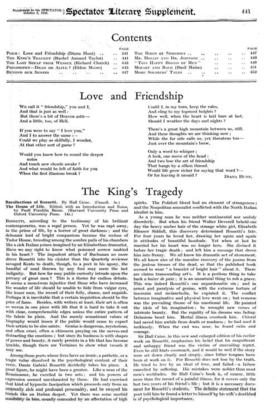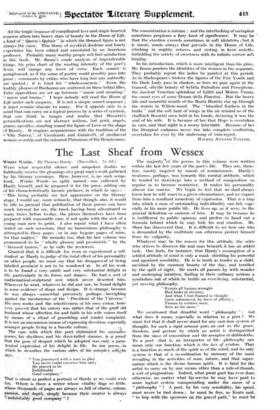The King's Tragedy
Recollections of Rossetti. By Hall Caine. (Cassell. 5s.) The House of Life.. Edited, with an Introduction and Notes,
by Paull Franklin Baum. (Harvard University Press and
Oxford University Press. 14s.)
RossErri, according to the testimony of his brilliant contemporaries, was a regal person. Yet he was rapt away, in the prime of life, by a horror of great darkness ;. and the debonair lord of bright companions became the recluse of Tudor House, brooding among the sombre palls of his chambers like a sick Italian prince imagined by an Elizabethan dramatist, Have we any right to know what poisoned sorrow rankled in his heart ? The impudent attack of Buchanan no more drove Rossetti into his cloister than the Quarterly reviewer savaged Keats to death, though, to a poet in his agony, the handful of mud thrown by any fool may seem the last indignity. But how far may public curiosity intrude upon the privacy of great men ? This is a theme for endless debate. It seems a monstrous injustice that those who have increased the wonder of life should be unable to hide from vulgar eyes, like lesser men, the record of their folly, shame, and anguish. Perhaps it is inevitable that a certain inquisition should be the price of fame. Besides, with writers at least, their art is often so woven in one piece with life that it is hard to take it out with clear, comprehensible edges unless the entire pattern of the fabric be plain. And the merely sensational values of biography would lessen if the public would cease to expect their artists to be also saints. Genius is dangerous, mysterious, and often cruel, often a chimaera preying on the nerves and distracting the emotions ;- but since its business is with-shapes of power and beauty, it rarely persists in a life that has become ignoble, though there are Verlaines to show what vessels it
may use.
Among thoie poets whose lives have an ironic, a pathetic, or a tragic value dissolved in the psychological content of their verse, Dante Gabriel Rossetti decidedly takes his place. A great figure, he might have been a greater. Like a man of the Renaissance, he excelled in two arts ; and his powers of expression seemed unexhausted by these. He had exercised that kind of hypnotic fascination which proceeds only from an unusually _rich and profound- personality, and he swayed his frit4ids like an Italian despot. Yet there was some morbid sensibility---in-hisa-, -usually concealed-by-an affectation of-higti
spirits. The Polidori blood had an element of strangeness ; and the Neapolitan sensualist conflicted with the North Italian idealist in him.
As a young man he was neither sentimental nor unduly disorderly. But when his friend Walter Deverell beheld one day the heavy amber hair of the strange white girl, Elizabeth Eleanor Siddall, this discovery determined Rossetti's fate. For four years he loved her, drawing her again and again in attitudes of beautiful lassitude. Yet when at last he married her his heart was no longer hers. She divined it before her tragic death ; and left him a message that drove him into frenzy. We all know his dramatic act of atonement. We all know also of the macabre recovery of the poems from the jealous tresses of the dead, so that the published book seemed to wear " a bracelet of bright hair " about it. There are claims transcending art's. It is a perilous thing to take back a baiser de paid ; it is an unnatural thing to rob a grave. This was indeed Rossetti's one unpardonable sin ; and in arrest and paralysis of genius, with the extreme torture of insomnia and melancholia, he expiated it. The conflict between imaginative and physical love went on ; but remorse was the prevailing theme of his emotional life. He painted the idols of his imagination ; he wrought new verses of intricate beauty. But the regality of his dreams was fading. Delusions beset him. Mortal illness overtook him. Chloral had saved him awhile from death or madness ; he had used it recklessly. When the end was near, he found calm and courage.
Sir Hall Caine, in this new and enlarged edition of his earlier work on Rossetti, emphasizes his belief that his magnificent
and unhappy friend was the victim of unavailing regret. Even he still hints overmuch, and it would be well if the story were set down clearly and simply, since bitter tongues have been at work on it. For Rossetti does not lose by the truth. He tried to live by an ideal of love, and failed—a failure cancelled by suffering. His mistakes were nobler than most men's rectitudes. Sir Hall Caine's book is, of course, little more than the record of a painful illness, for it covers only the last two years of his friend's life ; but it is a necessary docu- ment for Rossetti's students.- 'The definite statement thatthe poet told him he found a letter to himself by his wife's deathbed is of Psy importance. of complicated-love-and single-hearted remorse alters into heavy stars of beauty in the House of Life, a kind of " Queen's Quhair "in which the throned figure is not alway-S--the same. This litany of mysticaldoefrine and lonely. experience has been edited and annotated by an - Arrierican professor. Probably many worthy people will find satisfaction .in this book. Mr. Baum's crude analysis of imponderable :things, his grim chart of the wasting intensity of the poet's fevei, will -enrage any -lover of -verk. :Each • sonnet,' is paraphrased, as if the sense of poetry could-possibly pass into prose ::.comments by critics. who have long lost any, authority are quoted it is tried-• for -." whcilesOmenesk." . Even the loathly; Phrase's of Buchanan-are scattered on these bridal lilies. False Oppositions. are set up between " music and meaning," music and brains." I hope nobody will read the House of Life under such auspices. It is not a simple sonnet-sequence ; it nnist..-renfain Obscure to. many. For it aPpealS only to a Mind tht.eati, carry on a' logical process by a series. ofSymbols, that can think in images and realize that Rossetti's personifications are not abstract notions, but genii, angels, graces,apoStles; standing round_ the figure of-Love or the shape Of Beauty. • It requires acquaintance with the tradition of the
,` Vita . _of Cavalcanti and Guinicelli„ of mediaeval wornao-vorship and the coloured Platonism.of the'Renaissanee, The concentration is intense ; and the interlocking of metaphor sometimes perplexes a fiery knot of significance. It may le • that the emotion exceeds sometimes in soft idolatries ; but it is Music"; music always that .-prevails in ..the House of Life, climbing in mighty octaves and rioting in keen sestetts, forbidding the satiety of sweetness with its infinite sorrow ain longing.
In his introduction, which is more intelligent than his, gloss, Mr. Baum ponders the identities of the women in the sequence. They probably repeat the ladies he painted at this period. As in Shakespeare's history the figures of the Fair Youth and the Dark Lady pass in shadOw, so here we gaze again at the tranced, sibyllic beauty of Sybilla Palmifera and Persephone, the insolent Venetian splendour of Lilithand Mcifina Vanua, the sweet eyes of some Donna della Finestra. But the heavy lids and mournful mouth of the Beata Beatrix rise up through the waters in Willoiv-wood. The "bloodied feathers in the brake " and_ the soft beat of wings in the air remind us of the chaffinch Rossetti once held in his hands, declaring it was the soul of his wife. It is because of her that Hope is overtaken in vain, and that night is a weary labyrinth. Because of her the. liturgical cadences never rise into complete exultation, overtaken for ever by the undersong of vain-regret.
RACHEL AHNAND 'TAYLOR.























































 Previous page
Previous page